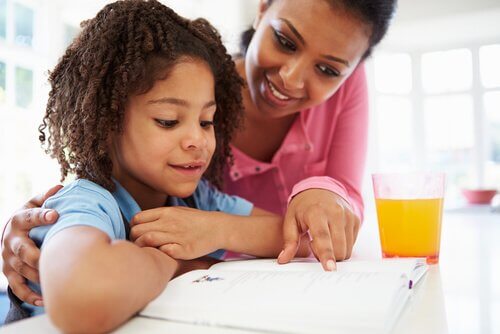How to Express that You're Proud of Your Children

Being a parent is one of the most beautiful and rewarding experiences in life. As time passes and children grow up, being proud of your children is a wonderful feeling for parents.
But sometimes it’s not easy to figure out how to tell our children that we’re proud of them. As a result, a difficult-to-solve equation can be presented.
Very few expressions of praise can negatively affect children. However, too many compliments can lead to arrogance.
When it comes to praising our children and expressing that we’re proud of them, finding the right balance and approach can be complicated at times.
That’s why we’ve prepared a list of tips to find the right approach to expressing that you’re proud of your children.
Expressing that you’re proud of your children
Being proud of your children has nothing to do with achieving something extraordinary or special. Pride comes from seeing the fruits of your labor as a parent as the years go by.
Certainly, this comforting feeling comes in seeing every step that your children take towards maturity, knowing that they’re much closer to self-sufficiency. It’s about recognizing the good things that they do in their life.
As a parent, you work tirelessly and with great care to provide your children with the tools they need to succeed and achieve feats and overcome challenges that come their way. Therefore, reaching this instance of satisfaction and pride is, without a doubt, a magical and insurmountable moment.

Proud parent, happier children
Being proud of your children and encouraging them in their actions has a very positive effect on their self-esteem. Being optimistic motivates them to do better and accomplish their goals.
For your children to do their best, you should show your appreciation and highlight good actions and progress, taking into account their weaknesses and strengths.
To find a balance between parental pride and extreme competitiveness, it’s important to reflect on your children’s strengths on a regular basis and share those reflections with them so that each day’s success can be a source of motivation.
“Very few expressions of praise can negatively affect children. However, too many compliments can lead to arrogance.”
How can you show your children that you’re proud of them?
Although it’s sometimes difficult to show your children how proud you are of them, the following tips can help you:
- Praise your children for the things that matter.
- Applaud the process more than the result.
- Remember the obstacles they’ve had to overcome to achieve a particular feat.
- Express confidence and appreciation in their abilities.
- Keeping your expressions of pride in context is important, although you shouldn’t overdo it.
- Your children receive compliments better when they’re close to achieving something. Therefore, choose the right moment.
- It can be easy for you to focus on other children’s achievements. But avoid making comparisons.
Words that every child should hear
Children basically learn in two fundamental ways: observing their parents’ actions and listening to their words. These are some of the best words you should say to your children:
“I’m proud of you”
If you’re proud of your children and want to tell them, don’t forget that the words must be genuine and sincere to truly mean something to them. Without a doubt, each of your children do something to make you proud.
“You’re very good at …”
Absolutely every child is good at something. If you observe that your child has a special ability, it’s good that you recognize it.
You should get involved in your children’s education if you want them to get good grades in school.

“You were created for something special”
Through these words, you provide your children with an optimistic vision and curiosity for the future. It isn’t always necessary to wait until they’re teenagers to start projecting the future with them. Start early and encourage them to think about who they want to become when they grow up.
Finally, you should bear in mind that motivated children who see their progress in a positive light have more confidence and happiness. In addition, the true pride to which a parent should aspire isn’t to make their children superior to another, but rather to make them all happy individuals.
Being a parent is one of the most beautiful and rewarding experiences in life. As time passes and children grow up, being proud of your children is a wonderful feeling for parents.
But sometimes it’s not easy to figure out how to tell our children that we’re proud of them. As a result, a difficult-to-solve equation can be presented.
Very few expressions of praise can negatively affect children. However, too many compliments can lead to arrogance.
When it comes to praising our children and expressing that we’re proud of them, finding the right balance and approach can be complicated at times.
That’s why we’ve prepared a list of tips to find the right approach to expressing that you’re proud of your children.
Expressing that you’re proud of your children
Being proud of your children has nothing to do with achieving something extraordinary or special. Pride comes from seeing the fruits of your labor as a parent as the years go by.
Certainly, this comforting feeling comes in seeing every step that your children take towards maturity, knowing that they’re much closer to self-sufficiency. It’s about recognizing the good things that they do in their life.
As a parent, you work tirelessly and with great care to provide your children with the tools they need to succeed and achieve feats and overcome challenges that come their way. Therefore, reaching this instance of satisfaction and pride is, without a doubt, a magical and insurmountable moment.

Proud parent, happier children
Being proud of your children and encouraging them in their actions has a very positive effect on their self-esteem. Being optimistic motivates them to do better and accomplish their goals.
For your children to do their best, you should show your appreciation and highlight good actions and progress, taking into account their weaknesses and strengths.
To find a balance between parental pride and extreme competitiveness, it’s important to reflect on your children’s strengths on a regular basis and share those reflections with them so that each day’s success can be a source of motivation.
“Very few expressions of praise can negatively affect children. However, too many compliments can lead to arrogance.”
How can you show your children that you’re proud of them?
Although it’s sometimes difficult to show your children how proud you are of them, the following tips can help you:
- Praise your children for the things that matter.
- Applaud the process more than the result.
- Remember the obstacles they’ve had to overcome to achieve a particular feat.
- Express confidence and appreciation in their abilities.
- Keeping your expressions of pride in context is important, although you shouldn’t overdo it.
- Your children receive compliments better when they’re close to achieving something. Therefore, choose the right moment.
- It can be easy for you to focus on other children’s achievements. But avoid making comparisons.
Words that every child should hear
Children basically learn in two fundamental ways: observing their parents’ actions and listening to their words. These are some of the best words you should say to your children:
“I’m proud of you”
If you’re proud of your children and want to tell them, don’t forget that the words must be genuine and sincere to truly mean something to them. Without a doubt, each of your children do something to make you proud.
“You’re very good at …”
Absolutely every child is good at something. If you observe that your child has a special ability, it’s good that you recognize it.
You should get involved in your children’s education if you want them to get good grades in school.

“You were created for something special”
Through these words, you provide your children with an optimistic vision and curiosity for the future. It isn’t always necessary to wait until they’re teenagers to start projecting the future with them. Start early and encourage them to think about who they want to become when they grow up.
Finally, you should bear in mind that motivated children who see their progress in a positive light have more confidence and happiness. In addition, the true pride to which a parent should aspire isn’t to make their children superior to another, but rather to make them all happy individuals.
All cited sources were thoroughly reviewed by our team to ensure their quality, reliability, currency, and validity. The bibliography of this article was considered reliable and of academic or scientific accuracy.
- Bowlby, J. (1986). Vínculos afectivos: formación, desarrollo y pérdida. Madrid: Morata.
- Bowlby, J. (1995). Teoría del apego. Lebovici, Weil-HalpernF.
- Garrido-Rojas, L. (2006). Apego, emoción y regulación emocional. Implicaciones para la salud. Revista latinoamericana de psicología, 38(3), 493-507. https://www.redalyc.org/pdf/805/80538304.pdf
- Marrone, M., Diamond, N., Juri, L., & Bleichmar, H. (2001). La teoría del apego: un enfoque actual. Madrid: Psimática.
- Moneta, M. (2003). El Apego. Aspectos clínicos y psicobiológicos de la díada madre-hijo. Santiago: Cuatro Vientos.
This text is provided for informational purposes only and does not replace consultation with a professional. If in doubt, consult your specialist.








